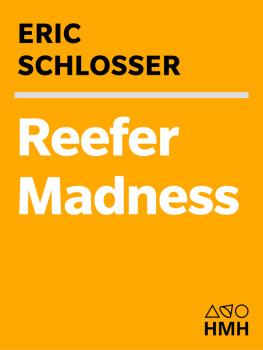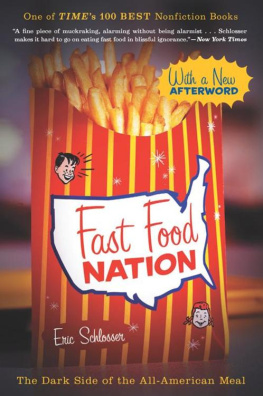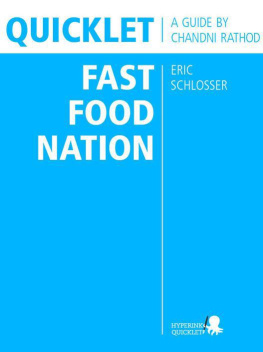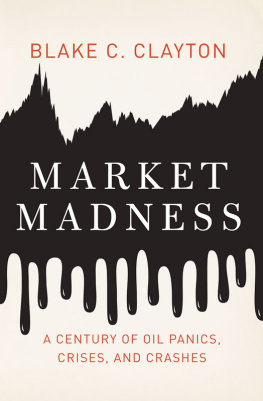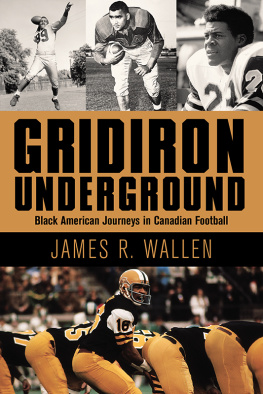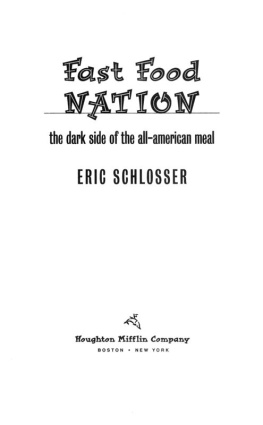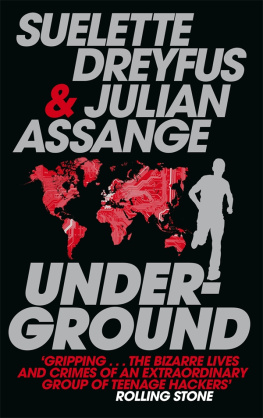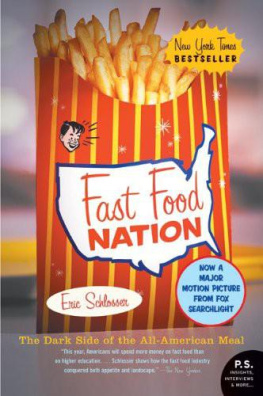FIRST MARINER BOOKS EDITION 2004
Copyright 2003 by Eric Schlosser
Afterword copyright 2004 by Eric Schlosser
ALL RIGHTS RESERVED
For information about permission to reproduce selections from this book, write to Permissions, Houghton Mifflin Harcourt Publishing Company, 215 Park Avenue South, New York, New York 10003.
www.hmhbooks.com
The Library of Congress has cataloged the print edition as follows:
Schlosser, Eric.
Reefer madness: sex, drugs, and cheap labor in the American black market / Eric Schlosser.
p. cm.
Includes bibliographical references and index.
ISBN 0-618-33466-1
ISBN 0-618-44670-2 (pbk.)
1. Informal sector (Economics)United StatesCase studies. 2. Black marketUnited StatesCase studies. 3. Marijuana abuseUnited States. 4. Migrant agricultural laborersCalifornia. 5. Illegal aliensCalifornia. 6. Sex-oriented businessUnited States. I. Title: Sex, drugs, and cheap labor in the American black market.
HD2346.U52S34 2003
330dc21 2002192164
e ISBN 978-0-547-52675-1
v2.0913
Portions of this book have appeared in slightly different form in the Atlantic Monthly, Rolling Stone, and U.S. News & World Report.
Devils Harvest poster, , courtesy of Something Weird Video.
Photograph of a strawberry worker, , copyright by Andrew Lichtenstein.
Photograph of Reuben Sturman, , courtesy of Richard N. Rosfelder, Jr.
For Cullen Murphy and William Whitworth
Sapere aude.
Dare to know.
HORACE
THE UNDERGROUND

A DAM SMITH BELIEVED in a God that was kind and wise and all-powerful. The great theorist of the free market believed in Providence. The happiness of mankind, Smith wrote, seems to have been the original purpose intended by the Author of nature. The workings of the Lord could be found not in the pages of a holy book, nor in miracles, but in the daily, mundane buying-and-selling of the marketplace. Each purchase might be driven by an individual desire, but behind them all lay the invisible hand of the Divine. This invisible hand set prices and wages. It determined supply and demand. It represented the sum of all human wishes. Without relying on any conscious intervention by man, the free market improved agriculture and industry, created surplus wealth, and made sure that the things being produced were the things people wanted to buy. Human beings lacked the wisdom, Smith felt, to improve society deliberately or to achieve Progress through some elaborate plan. But if every man pursued his own self-interest and obeyed only his passions, the invisible hand would guarantee that everybody else benefited, too.
Published in 1776, The Wealth of Nations later had a profound effect upon the nation born that year. The idea that life, liberty, and the pursuit of happiness were unalienable rights, endowed by a Creator, fit perfectly with the economic theories of Adam Smith. Life, liberty and estate was the well-known phrase that Thomas Jefferson amended slightly for the Declaration of Independence. The United States was the first country to discard feudal and aristocratic traditions and replace them with a republican devotion to marketplace ideals. More than two centuries later, Americas leading companiesGeneral Motors, General Electric, ExxonMobil, Microsoft, Wal-Mart, Boeing, et al.have annual revenues larger than those of many sovereign states. No currency is more powerful than the U.S. dollar, and the closing prices on Wall Street guide the financial markets of Tokyo, London, Paris, and Frankfurt. The unsurpassed wealth of the United States has enabled it to build a military without rival. And yet there is more to the U.S. economy, much more, than meets the eye. In addition to Americas famous corporations and brands, the invisible hand has also produced a largely invisible economy, secretive and well hidden, with its own labor demand, price structure, and set of commodities.
Black, shadow, irregular, informal, illegal, subterranean, undergrounda variety of adjectives have been used to describe this other economy. Although defined in numerous ways, at its simplest the American underground is where economic activities remain off the books, where they are unrecorded, unreported, and in violation of the law. These activities range from the commonplace (an electrician demanding payment in cash and failing to declare the payment as income) to the criminal (a gang member selling methamphetamine). They include moonlighting, check kiting, and fencing stolen goods; street vending and tax evading; employing day laborers and child laborers; running sweatshops and chop shops; smuggling cigarettes, guns, and illegal immigrants; selling fake Rolexes, pirating CDs. Economists disagree about the actual size of the underground economy and how to measure it. Some studies look at the discrepancy between the amount of personal income declared on tax returns and the amount of money that is actually spent. Other studies examine changes in currency supply, the velocity of money, levels of electricity usage. Each of these methodologies has its merits. All have produced conclusions that are debatable. There is general agreement, however, on two points: Americas underground economy is vastand most of its growth occurred in the past thirty years.
Any estimate of illegal economic activity is bound to lack precision, since it attempts to quantify things that people have carefully tried to hide. Nevertheless, the best estimates convey a sense of scale and proportion. In 1997 the Austrian economist Friedrich Schneider calculated the rise of Americas shadow economy by tracing changes in the demand for currency. According to Schneider, in 1970 the size of the underground was between 2.6 and 4.6 percent of Americas gross domestic product (GDP). By 1994 it had reached 9.4 percent of the GDPabout $650 billion. Using a different methodology in 1998, Charles Rossotti, the commissioner of the Internal Revenue Service, told Congress that during the previous year Americans had failed to pay about $200 billion of federal taxes that were owed, an amount larger than the governments annual spending on Medicare. Assuming an average federal tax rate of 14 percent, that means Americans somehow neglected to report almost $1.5 trillion in personal income. The IRS estimate did not include undeclared earnings from criminal activity.
Two other periods in modern American history were marked by thriving underground economies. From 1920 to 1933, the prohibition of alcohol led to widespread trafficking and the rise of organized crime. At the height of Prohibition, Americans spent about $5 billion a year on alcohol (roughly $54 billion in todays dollars). This black market constituted about 5 percent of the U.S. gross national product at the time. When Prohibition ended, some bootleggers became well-respected businessmen. During the Second World War, the imposition of rationing and price controls created even larger black markets. A system designed to distribute scarce commodities fairly had some unanticipated effects: a burgeoning trade in ration books and a hidden cash economy. Perhaps 5 percent of the nations gasoline and 20 percent of its meat were soon bought and sold illegally. According to one estimate, by the end of the war Americans were failing to report as much as 15 percent of their personal income. The underground subsided amid the prosperity of the Eisenhower era. Wages increased, tax evasion decreased, and no illegal commodity generated the sort of profits once supplied by bootleg alcohol. And then at some point in the mid- to late 1960s the underground economy began to grow. Conservative economists point to high income tax rates and excessive government regulation as the fundamental causes. Liberals contend that declining wages, unemployment, union busting, and the business deregulation of the Reagan years were much more responsible for shifting economic activity underground. The explanations offered by the left and the right are not mutually exclusive. A stagnant economy prompted Americans of every background to work off the books. The hippie counterculture of the 1960s and the anti-tax movement of the late 1970s shared common ground in their dislike of government, encouraging defiance of the IRS. A new drug culture provided new opportunities for organized crime. The expansion of Americas underground economy over the last thirty years stemmed not only from economic hardship and a desire for illegal profits, but also from a growing sense of alienation, anger at authority, and disrespect for the law.
Next page
